Wister Owen
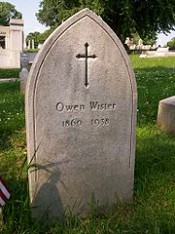
(2) In his later years, Wister was an opponent of Franklin D. Roosevelt and the New Deal, but he was personally and politically close to FDR's distant cousin, Theodore Roosevelt. (3) As with Theodore Roosevelt's first wife, Wister's wife too died in childbirth. Owen Wister (July 14, 1860 – July 21, 1938) was an American writer and "Father" of western fiction. Owen Wister was born on July 14, 1860,[1] in Germantown, a neighborhood within the City of Philadelphia, Pennsylvania.[2] His father, Owen Jones Wister, was a wealthy physician, one of a long line of Wisters raised at the storied Belfield estate in Germantown.[3] His mother, Sarah Butler Wister, was the daughter of actress Fanny Kemble.[4] He briefly attended schools in Switzerland and Britain, and later studied at St. Paul's School in Concord, New Hampshire and Harvard University in Cambridge, Massachusetts, where he was a classmate of Theodore Roosevelt, an editor of the Harvard Lampoon and a member of Delta Kappa Epsilon (Alpha chapter). Wister graduated from Harvard in 1882. At first he aspired to a career in music, and spent two years studying at a Paris conservatory. Thereafter, he worked briefly in a bank in New York before studying law, having graduated from the Harvard Law School in 1888. Following this, he practiced with a Philadelphia firm, but was never truly interested in that career. He was interested in politics, however, and was a staunch Theodore Roosevelt backer. In the 1930s, he opposed Franklin D. Roosevelt and the New Deal. Wister had spent several summers out in the American West, making his first trip to Wyoming in 1885. Like his friend Teddy Roosevelt, Wister was fascinated with the culture, lore and terrain of the region. On an 1893 visit to Yellowstone, Wister met the western artist Frederic Remington; who remained a lifelong friend. When he started writing, he naturally inclined towards fiction set on the western frontier. Wister's most famous work remains the 1902 novel The Virginian, the loosely constructed story of a cowboy who is a natural aristocrat, set against a highly mythologized version of the Johnson County War and taking the side of the large land owners. This is widely regarded as being the first cowboy novel and was reprinted fourteen times in eight months.[5] The book is dedicated to Theodore Roosevelt. In 1898, Wister married Mary Channing, his cousin.[6] The couple had six children. Wister's wife died during childbirth in 1913, as Theodore Roosevelt's first wife had died giving birth to Roosevelt's first daughter, Alice.[7] Wister died at his home in Saunderstown, Rhode Island. He is buried in Laurel Hill Cemetery in Philadelphia. Since 1978, University of Wyoming Student Publications has released the annual literary and arts magazine Owen Wister Review. The magazine was published bi-annually until 1996. It became an annual publication in the spring of 1997. Just within the western boundary of the Grand Teton National Park, there is a 11,490-foot mountain named Mount Wister named for Owen Wister.[8] Near a home that he had built near La Mesa, California, but was never able to live in because of the death of his wife, is a street called "Wister Drive." In the same neighborhood are found "Virginian Lane" and "Molly Woods Avenue."[9][10] Books and stories: Poetry: Films Inspired by The Virginian: Television Shows Inspired by The Virginian:
do you like this author?
What readers are saying
What do you think? Write your own comment on this book!
write a commentWhat readers are saying
What do you think? Write your own comment on this author!
write a commentBook list

the new swiss family robinson a tale for children of all ages
Series:
Unknown
Year:
Unknown
Raiting:
4/5
Show more
add to favoritesadd In favorites
Book list

the new swiss family robinson a tale for children of all ages
Series:
Unknown
Year:
Unknown
Raiting:
4/5
Show more
add to favoritesadd In favorites
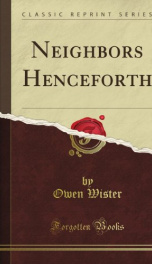
neighbors henceforth
Series:
Unknown
Year:
Unknown
Raiting:
4/5
-About the Publisher Forgotten Books is a publisher of historical writings, such as: Philosophy, Classics, Science, Religion, History, Folklore and Mythology.Forgotten Books' Classic Reprint Series utilizes the latest technology to regenerate facsimiles of historically important writings. Careful attention has been made to accurately preserve the original format of each page whilst digitally enhancing the difficult to read text. Read books online for free at www.forgottenbooks.org
Show more
add to favoritesadd In favorites
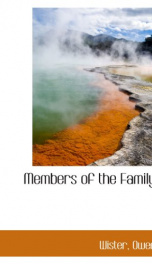
members of the family
Series:
Unknown
Year:
Unknown
Raiting:
4/5
The Shelf2Life Western Fiction Collection is a fascinating set of pre-1923 materials that capture the beauty, mystery and adventure of the old west. From honorable cowboys and spirited pioneer women to questionable sheriffs, notorious gunslingers and unruly outlaws, these classic westerns introduce lively characters who embody the essence of the American frontier. Authentic dialog combined with vivid scenic descriptions help re-create a time and place where chasing cattle rustlers, tracking wild horses and fighting for land were a part of everyday life, highlighting the strength of character necessary to survive. The Shelf2Life Western Fiction Collection allows readers to escape the modern world and be transported into the rough and tumble escapades of the Wild West.
Show more
add to favoritesadd In favorites
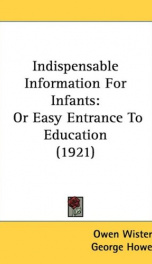
indispensable information for infants
Series:
Unknown
Year:
Unknown
Raiting:
4/5
This volume is produced from digital images created through the University of Michigan University Library's preservation reformatting program. The Library seeks to preserve the intellectual content of items in a manner that facilitates and promotes a variety of uses. The digital reformatting process results in an electronic version of the text that can both be accessed online and used to create new print copies. This book and thousands of others can be found in the digital collections of the University of Michigan Library. The University Library also understands and values the utility of print, and makes reprints available through its Scholarly Publishing Office.
Show more
add to favoritesadd In favorites

critical and social essays reprinted from the new york nation
Series:
Unknown
Year:
Unknown
Raiting:
4/5
Show more
add to favoritesadd In favorites
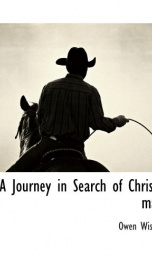
a journey in search of christmas
Series:
Unknown
Year:
Unknown
Raiting:
5/5
The Shelf2Life Western Fiction Collection is a fascinating set of pre-1923 materials that capture the beauty, mystery and adventure of the old west. From honorable cowboys and spirited pioneer women to questionable sheriffs, notorious gunslingers and unruly outlaws, these classic westerns introduce lively characters who embody the essence of the American frontier. Authentic dialog combined with vivid scenic descriptions help re-create a time and place where chasing cattle rustlers, tracking wild horses and fighting for land were a part of everyday life, highlighting the strength of character necessary to survive. The Shelf2Life Western Fiction Collection allows readers to escape the modern world and be transported into the rough and tumble escapades of the Wild West.
Show more
add to favoritesadd In favorites
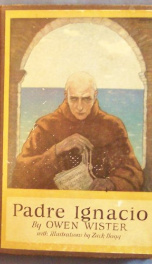
Padre Ignacio; or, the song of temptation
Series:
Unknown
Year:
Unknown
Raiting:
3.2/5
A story of old California!!
Show more
add to favoritesadd In favorites

Mother
Series:
Unknown
Year:
Unknown
Raiting:
4.5/5
This volume is produced from digital images created through the University of Michigan University Library's preservation reformatting program. The Library seeks to preserve the intellectual content of items in a manner that facilitates and promotes a variety of uses. The digital reformatting process results in an electronic version of the text that can both be accessed online and used to create new print copies. This book and thousands of others can be found in the digital collections of the University of Michigan Library. The University Library also understands and values the utility of print, and makes reprints available through its Scholarly Publishing Office.
Show more
add to favoritesadd In favorites
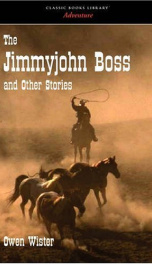
The Jimmyjohn Boss and Other Stories
Series:
Unknown
Year:
Unknown
Raiting:
3.5/5
A collection of classic tales of the Old West from Owen Wister, an American writer whose stories helped establish the cowboy as the archetypical individualist hero. Includes "The Jimmyjohn Boss," "A Kinsman of Red Cloud," "Sharon's Choice," "Napoleon Shave-Tail," "Twenty Minutes for Refreshments," "The Promised Land," "Hank's Woman," and "Padre Ignazio." Newly designed and typeset for easy reading by Boomer Books.
Show more
add to favoritesadd In favorites

How Doth the Simple Spelling Bee
Series:
Unknown
Year:
Unknown
Raiting:
2.5/5
Purchase of this book includes free trial access to www.million-books.com where you can read more than a million books for free. This is an OCR edition with typos. Excerpt from book: Chickle University, Arkansopolis, October 6, 1906. English spelling rotten to the core. Help us. Masticator B. Fellows. I responded, not without satire: Utterly prostrated by news. Helpless. Thomas Greenberry. And thinking that thus I was rid of him, I proceeded quietly with the index of my forthcoming volume. But Masticator B. Fellows, president and proprietor of Chickle University, had not done with me so easily. Since his street-boyhood, sixty years ago, this ardent personality ('tis thus the daily press describes him) had made his own way, and had his own way; he was his own capital, and there is no record of his ever having sunk a cent of it. Of habits strictly pure, he had never seen a card or a drop of liquor that he had touched, and he had never seen a dollar that he had not touched. He had organized every industry along his path, from paper-selling, boot-blacking, and so upward to his organized lobby at Washington, through which he had caused a heavy tariff to be put upon every commodity necessary to the American people. It was he who had advised his brother organizers to keep Religion on the free list, because, as he assured them, "if we tax it, they'll do without it, while if we don't, they'll trust us for a while yet." And now, at the age of seventy-five, with uncounted millions, and ten United States Senators, and a fourth young wife all in his pocket, he proposed to hand his name to Immortality by simplifying the spelling of English all over the earth. Well, let him do it if he would only do it right. But this he must do without my assistance; there were other professors, many of them. I did not permit the circulars that now began to pour in from Chickle University to distract me from my index. Striking as these circulars were and I will i...
Show more
add to favoritesadd In favorites

Red Men and White
Series:
Unknown
Year:
Unknown
Raiting:
3/5
Purchase of this book includes free trial access to www.million-books.com where you can read more than a million books for free. This is an OCR edition with typos. Excerpt from book: THE SERENADE AT SISKIYOU Unskilled at murder and without training in running away, one of the two Healy boys had been caught with ease soon after their crime. What they had done may be best learned in the following extract from a certain official report: " The stage was within five miles of its destination when it was confronted by the usual apparition of a masked man levelling a double-barrelled shot-gun at the driver, and the order to ' Pull up, and throw out the express box.' The driver promptly complied. Meanwhile the guard, Buck Montgomery, who occupied a seat inside, from which he caught a glimpse of what was going on, opened fire at the robber, who dropped to his knees at the first shot, but a moment later discharged both barrels of his gun at the stage. The driver dropped from his seat to the foot-board with five buckshot in his right leg near the knee, and two in his left leg; a passenger by his side also dropped with three or four buckshot in his legs. Before the guard could reload, two shots came from behind the bushes back of the exposed robber, and Buck fell to the bottom of the stage mortally wounded shot through the back. The whole murderous sally occupied but a few seconds, and the order came to ' Drive on.' Officers and citizens quickly started inpursuit, and the next day one of the robbers, a well- known young man of that vicinity, son of a respectable farmer in Fresno County, was overtaken and arrested." Feeling had run high in the streets of Siskiyou when the prisoner was brought into town, and the wretch's life had come near a violent end at the hands of the mob, for Buck Montgomery had many friends. But the steadier citizens preserved the peace, and the murderer was in the prison awaiting his trial by formal law. It was now some weeks since the trag...
Show more
add to favoritesadd In favorites
What readers are saying
What do you think? Write your own comment on this author!
write a commentGenre
- Nonfiction / Politics / General
- Books / Electronic books
- Literature & Fiction
- Literature & Fiction / Classics
- Religion & Spirituality / Christianity / Literature & Fiction / Fiction
- Travel / Europe
- Literature & Fiction / Genre Fiction / Action & Adventure
- Books / Western stories
- Nonfiction / Education / Education Theory / History
- Literature & Fiction / World Literature
if you like Wister Owen try:
readers also enjoyed
What readers are saying
What do you think? Write your own comment on this author!
write a commentGenre
- Nonfiction / Politics / General
- Books / Electronic books
- Literature & Fiction
- Literature & Fiction / Classics
- Religion & Spirituality / Christianity / Literature & Fiction / Fiction
- Travel / Europe
- Literature & Fiction / Genre Fiction / Action & Adventure
- Books / Western stories
- Nonfiction / Education / Education Theory / History
- Literature & Fiction / World Literature
if you like Wister Owen try:
readers also enjoyed
Do you want to read a book that interests you? It’s EASY!
Create an account and send a request for reading to other users on the Webpage of the book!

